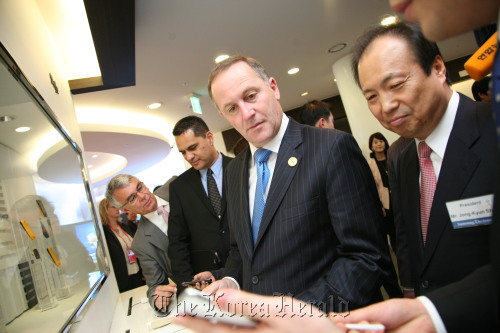New Zealand’s prime minister on Monday expressed hope that a free trade agreement between his country and Korea will be concluded soon.
After a meeting with members of New Zealand Chamber of Commerce in Seoul, Prime Minister John Key told The Korea Herald that without a free trade agreement, his country’s companies would eventually be priced out of the Korean market.
The New Zealand leader came to Korea to attend the Nuclear Security Summit that began its two-day run in Seoul on Monday.
Key added that some very large New Zealand companies that operate in the Korean market were “just clinging on.”
 |
New Zealand Prime Minister John Key (second from right) and Samsung Electronics’ mobile chief Shin Jong-kyun (right) view the features of the Korean IT giant’s gadget Galaxy Note at the firm’s digital complex in Suwon, Gyeonggi Province on Monday.(Samsung Electronics) |
“If you look at Fonterra and Zespri, they will probably not last in this market beyond a few years ― at least until an FTA is completed, the tariffs are just too great,” Key said.
Last year, the kiwi fruit giant Zespri paid $32 million in tariffs to get their products onto Korean shelves.
Currently, New Zealand’s agricultural and food sector pays around 45 percent in tariffs. Chile, New Zealand’s No. 1 competitor for kiwi fruit, pays a 12 percent tariff.
“So this is a huge issue for Zespri and Fonterra,” he said.
Key added that there are a number of New Zealand companies that are staying in this market out of optimism that a free trade agreement will be completed.
“If it doesn’t happen then eventually the margin would be so great that they would lose money,” Key said.
The investment state dispute settlement, an important issue in the Korea-Australia free trade talks, is not as significant an issue with New Zealand, said Key.
Trade between the two countries grew to slightly more than $2.5 billion last year.
With the number of people in the world passing 7 billion, food inflation has become a sensitive issue. Key knows that consumers want to buy New Zealand products due to their natural and clean agricultural practices.
“Koreans are very sensitive to food security issues, we see it on the tourism side, whenever there’s an issue like swine flu, the Korean market is the first market that stops traveling,” said Key who is also the New Zealand tourism minister.
By Yoav Cerralbo (
yoav@heraldcorp.com)








